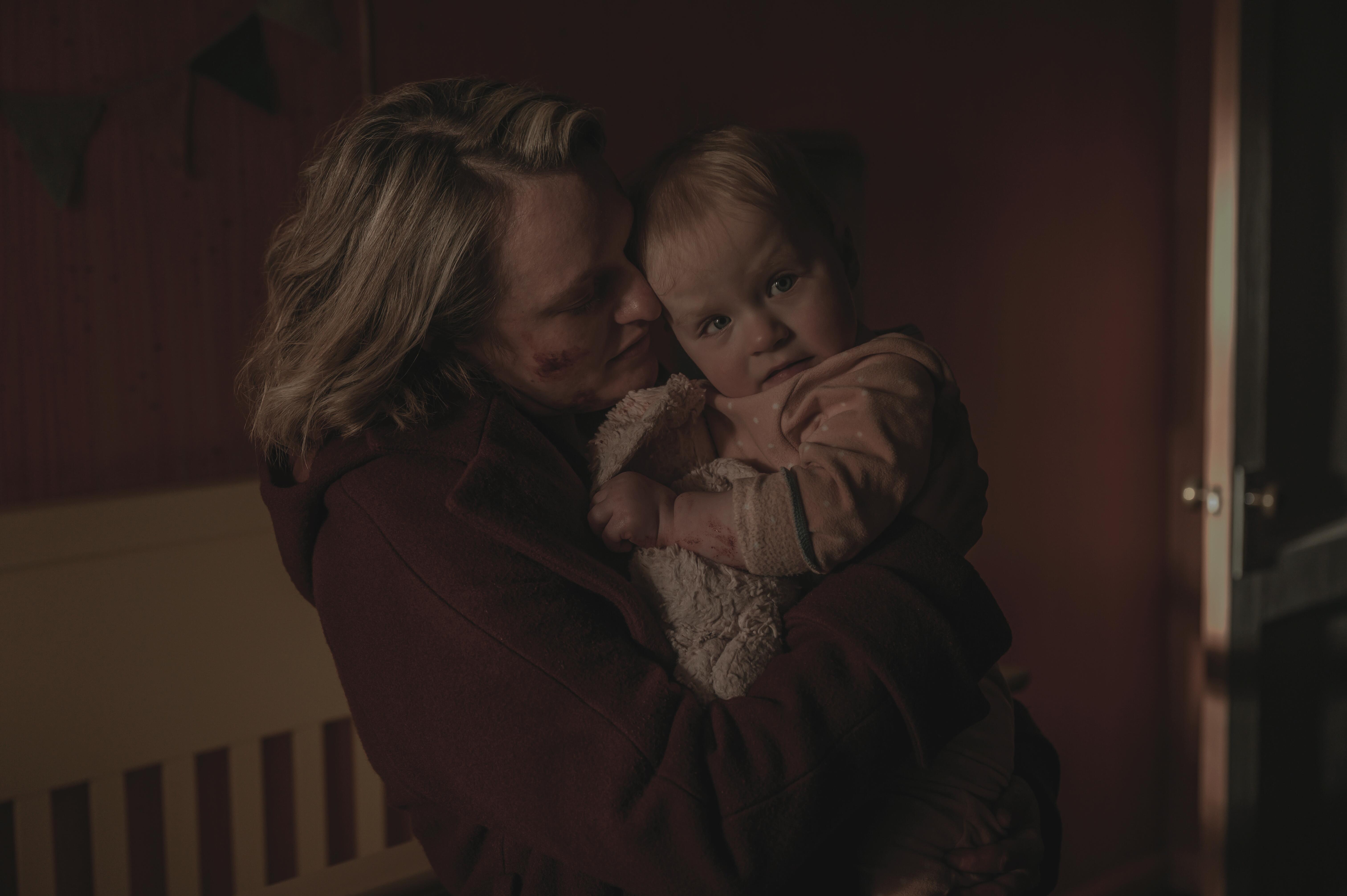What to Watch Verdict
An electrifying finale takes a page from the Old Testament and suggests major changes are ahead.
Pros
- +
🔴Elisabeth Moss and Joseph Fiennes are electrifying in an excellent two-hander scene.
- +
🔴Lots of potential shifts set up for Season 5.
- +
🔴Callbacks to Season 1 are earned and add texture.
- +
🔴Director Liz Garbus effectively builds dread and leaves us guessing.
Cons
- -
🔴THAT scene will be considered too grisly for some.
- -
🔴June, wash your hands.
- -
🔴Tuello redeemed himself but I still don't trust him.
- -
🔴No Aunt Lydia and Janine.
🚨This post contains spoilers for The Handmaid's Tale 🚨
Read our last review here.
Ceremonies and rituals performed in Gilead are steeped in the Old Testament from the passage read during the sanctioned rapes in the name of God (and fertility) to the extreme forms of punishment enacted on anyone who has done wrong by this nation. In an incident that occurred before the series started, Janine’s (Madeline Brewer) eye was removed because she acted out of turn toward the Aunts. A handmaid’s body is precious to this regime, though certain parts are disposable and used to instill disciple; this motivated Janine to counsel teenager Esther (Mckenna Grace) before they cut out her tongue. In the very first episode of The Handmaid’s Tale, a man is sentenced to death for rape, and this form of capital punishment is carried out by the handmaids. Aunt Lydia (Ann Dowd) presides over the public execution known as a “salvaging” that sees the women form a circle around the condemned, and at the sound of her whistle, the beating begins. Participation is mandatory and moments like this are impossible to shake, even after freedom has been sought.
Season 4 of Bruce Miller’s adaptation of Margaret Atwood’s 1985 novel has broken one cycle that saw June Osborne (Elisabeth Moss) escape the clutches of the totalitarian society, but her time in Canada only emphasizes how Gilead has changed her every fiber. Moving on is an abstract concept and the thought of a free Fred Waterford (Joseph Fiennes) means her visceral anger is like a dripping faucet that cannot be fixed. Trauma and rage are entwined, and her fury cannot be quelled. When Aunt Lydia blew her whistle way back when, June had just heard a rumor that Moira (Samira Wiley) had been sent to the Colonies and was likely dead, and this opportunity to exorcise her aggression presented itself. June was the first to strike and the barbaric practices of this nation led to many unspeakable moments, which includes the execution in the Season 4 premiere.
This time there is no stage or whistle, but June takes on the role of Aunt Lydia when she condemns Esther’s rapist to death. Unlike the pilot episode, this not a group endeavor as she hands the teenager the butcher’s knife with some words of encouragement before departing — when the handmaids first capture this man there is a beating en masse. Reverting back to this role, June puts on her Aunt Lydia cap in the finale when she presides over the shocking end to Commander Waterford.

Earlier in the episode, June shares a two-hander scene reminiscent of the delicate balance she had to walk when she was called Offred. “The Wilderness” opens with a flashback to one of the occasions Fred took June to Jezebels dressed in a sequin mini dress, and she had to stifle every urge to hurt him. Pretending to love him was necessary for survival and he is so conceited that he actually believed her. She did such a good job of maintaining this ruse that he never even sensed a connection with Nick (Max Minghella) and is visibly horrified when the pair embrace in front of him. Every single other person in the Waterford house knew except him and his obliviousness speaks to how Nick has got away with this forbidden romance for so long. In addition, Fred’s ability to frame his every misdeed as a pious act would be impressive if it wasn’t so horrifying, and this is no more evident than during drinks with June.
The tension of this scene comes from not knowing whether June can contain her fury at every deluded comment he makes — my notes for this scene feature the word “yikes” on repeat — including “what we had was vital.” He refers to their relationship as something akin to love and even mentions that he misses Offred. It is surprising when June is in agreement with this sentiment, but she adds, “I miss her strength.” I was convinced that June was going to redecorate this luxury cell with Fred’s blood, however, she shows great restraint tapping into the survival tactics she developed in his home. This scene is a triumph of execution by first-time Handmaid’s Tale director Liz Garbus (who is a renowned documentary filmmaker), and the various emotions Moss portrays are another reminder (like we needed one) that she is one of the best actresses on TV. Subtle switches between hatred, bewilderment and sorrow in the face of Fred’s delusion make this a masterclass and one that Fiennes steps up to. It is also after this interaction that she knows she has to think more like a Commander in her approach.

“You know, Gilead turns you into a bit of a cunt,” June says to Mark Tuello (Sam Jaeger) when she apologizes for waiting outside his home in a bid to convince him to seek an alternative path with regards to Fred’s immunity deal. Up to this point, Tuello has been somewhat ineffectual when it comes to seeking justice and views Fred as a means to an end. He knows what the Commander did to June — and many other women — and that he is complicit in many, many other atrocities. Not only did he help enact wide-scale tyranny, but he helped build this world, and if he is free to spout his miracle-laced sermons there is a chance that this influence could create the next Gilead. Yes, the intel is valuable but there are other factors to consider. June knows she needs to make Tuello an offer he can’t refuse and her strategizing involves a figure who is equally adept at negotiating.
The latest updates, reviews and unmissable series to watch and more!
Unlike her last conversation with Commander Joseph Lawrence (Bradley Whitford) when she was trying to get Hannah back without anything to trade, she is offering the return of Fred Waterford in exchange for 22 women they believed to be dead. Tuello is reluctant at first and June labors the point that his desire is to save lives, and this figure is monumental. Because of how useless Tuello has been in the past, I didn’t hold much hope for him to come through, but he evidently sold this idea to his higher-ups. There is also a vibe between him and Serena Joy (Yvonne Strahovski) that has been present since they first met in Season 2 and with Fred out of the way it means the door has been left open for this unholy union.

Before June goes to see Fred, she tells Emily (Alexis Bledel) that “A good mother would be able to let go.” She is, of course, referring to the Commander and the ex-handmaid group sessions highlighted how different June’s approach is to Moira’s. Emily is a kindred spirit and rewatching the “salvaging” scene in “Offred” is another reminder of the bond they have. While Moria wants to use legal channels to stop Fred from being freed, June knows this will achieve nothing as her statement has already been heard (and ignored). The revenge fantasy conversation in “Testimony” comes to life at the end of “The Wilderness,” and in the lead-up to this moment, Emily asks what June wants to happen to Fred. Her desire is for him to feel what she did the moment Hannah was ripped from her arms and they were taken in the woods. During her meeting with Fred, he apologized for this act because he now understands the bond between parent and child. This moment has real “As the father of a daughter” energy in that he can only empathize now that he is on the verge of becoming a dad. And while June doesn’t take his son from him, she does give Fred a Gilead-style form of punishment. In a moment of handmaid telepathy that we saw the origins of at the end of “The Crossing,” it is clear Emily and June are hatching a plan, and Emily’s reference to the Old Testament in their earlier conversation is a clue.
“I’m a man and I have rights!” Fred yells as his freedom is snatched away and he lacks any self-awareness. He pleads with Nick and thinks repeatedly calling him “son” will bend him to his will. “Do not be deceived, God is not to be mocked; for whatever a man sows, so shall he reap,” is all Nick has to say, mimicking his former boss (and quoting from "Galatians") before greeting the love of his life. While last week’s reunion was framed by sunlight, this one is in darkness (aside from the mood). He makes his leave, knowing exactly what is about to happen — it is notable that Nick's choice of Bible quotes comes from the New Testament.
This is an unsanctioned “salvaging” and Fred would’ve been better off choosing the quick release of a bullet over the whistle. Emily and many other ex-handmaids join this chase across no man’s land and the strains of “You Don’t Own Me” accompany this gruesome end — this on-the-nose song was first used at the end of The Handmaid’s Tale’s pilot episode. This show doesn’t refrain from tough scenes and while this might be a step too far for some viewers, it is a violent end that matches the violence of this world — if you have got this far you are probably used to how grim it can get. Okay, the bite was maybe a bridge too far. The aerial shot of the torch-lit circle is a Handmaid’s Tale signature visual that underscores the cyclical nature of this society.

Out of the dark woods steps a woman in dark red with a blood-stained face and hands: where does June go from here? The answer is home, but this is only a temporary stop to say goodbye to the daughter she doesn’t feel like she can raise. This has been an underlying source of tension as Luke’s (O-T Fagbenle) desire for a normal life free from the Gilead shackles is not one she can be part of. Seeing the effortlessness of the Moira and Luke parenting team is her perceived notion of what will be better for Nichole, even if her view is tainted by an inner saboteur. When Luke sees his wife covered in blood hugging Nichole he sinks down to the ground, defeated — June probably should’ve washed her hands first. Sandwiched between two beautiful shots of June framed in sunlight with Nichole is an image of a headless Fred hanging from a wall, “NOLITE TE BASTARDES CARBORUNDORUM” (aka “Don’t Let the Bastards Grind You Down”) written in his blood as a signature. Fred is but one Commander and there is still plenty of work to be done.
Previous seasons have ended on expected (see Season 1 following the novel) and frustrating notes (see Season 2 and 3), but there is something exciting and unknowable about this massive shift. As far as we know, the Mayday network is still active and for a woman who feels like she cannot be done with Gilead until Gilead is done, it makes sense for June to go down this resistance path — and maybe for Emily to join her. There have been some bumpy moments this season and arcs that suggested narrative repeats, however, this finale stuck the landing and showed that the cycle can be broken.
Unanswered Questions
*What does this mean for Serena Joy? We saw her cultivating the press and no doubt she can get another book deal and speaking tour to mirror the pre-Gilead academic role she occupied. She needed Fred in Gilead, but now that he is gone I think she will be a more foreboding and terrifying force. She tepidly agreed to Zoom while he was in Geneva and there wasn’t even a hug or kiss goodbye, so she probably won't be too cut up when she is given the news of his death — though she might want to punish the ex-handmaids for their disrespect. Will she be freed from prison? And what will June do if she is?
*Another question mark is Nick’s recent betrothal as the identity of his new wife and the circumstances still remain a mystery. He once again proved he would do anything for June, but will this expand further into bringing Gilead down from the inside? His alliance with Lawrence isn't airtight and future conflict could be down the road if Lawrence wants to make Gilead stronger.
*Aunt Lydia, Janine, and Esther are notably absent in “The Wilderness” and their involvement comes from references to scenes they were in. I am intrigued to see where we will find the three of them when the series returns for Season 5 (will Janine or Esther become Nick’s handmaid?) and how much The Testaments will factor.
*While I’m on this subject, readers of The Testaments will know what becomes of Nichole and it looks like this series is setting up this path for her — Hulu also has the rights to Atwood’s 2019 sequel.
Emma Fraser spends most of her time writing about TV, fashion, and costume design; Dana Scully is the reason she loves a pantsuit. Words can also be found at Vulture, Elle, Primetimer, Collider, Little White Lies, Observer, and Girls on Tops. Emma has a Master’s in Film and Television, started a (defunct) blog that mainly focused on Mad Men in 2010, and has been getting paid to write about TV since 2015. It goes back way further as she got her big start making observations in her diary about My So-Called Life’s Angela Chase (and her style) at 14.


